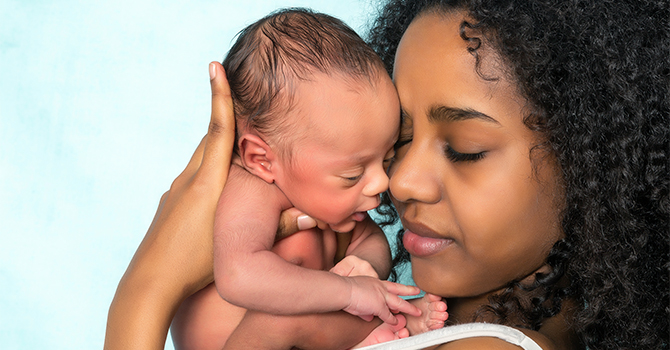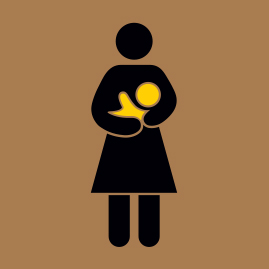State of Maternal Mortality: The Inequitable Burden on Black Mothers

Kyle Simone Nisbeth
PhD Student in Health Behavior and Health Education
The state of Black maternal health in the United States is a public health crisis, with Black mothers dying at unprecedented levels.
For the last 25 years, black women have been dying from pregnancy-related complications at rates 3 to 4 times—320% higher—than white women.1
Given that the majority of these deaths are preventable, lingering questions remain. Why is the disparity so high? What is being done to address it?
Within social landscapes and in health care systems, racism plays a significant role.2 News stories have highlighted accounts of women whose blatant mistreatment by or disregard from their medical care team led to life-threatening or life-ending circumstances. Los Angeles mother Kira Johnson died in 2016 from a blood hemorrhage ten hours after giving birth. Her husband recalls being dismissed by doctors, who told him that his wife “was not a priority right now.”
The weathering hypothesis details the biological effects of racism.
The effects of racism manifest detrimentally over time in what Arline Geronimus, professor of Health Behavior and Health Education at the University of Michigan School of Public Health calls the “weathering hypothesis.” Introduced in 1992, the weathering hypothesis details the biological effects of racism. It holds that Black women experience early, accelerated aging as a result of their cumulative exposure to the consequences of racism.3 The effects of weathering include a rise in health risks at younger ages for conditions that impact pregnancy and the likelihood of experiencing complications, such as hypertension, type 2 diabetes, and high blood pressure.4
While the US is largely failing its Black mothers,5 Black women are unifying to address maternal mortality, advocate for reproductive justice, and effectively save one another. From a policy standpoint, the Maternal Care Access and Reducing Emergencies (Maternal CARE) Act—reintroduced in Congress in 2019—calls for the allocation of funds to provide racial bias programming for maternal care workers and medical students, identify high-risk pregnancies, and provide mothers with culturally competent care6.
Black women bear the heaviest burden of maternal health disparities in the US.
Groups like the Black Mamas Matter Alliance and SisterSong inform and advance social policy and understanding through their research initiatives. Together, they have submitted “Reproductive Injustice: Gender and Racial Discrimination in US Health Care,” a report to the United Nations Committee on the Elimination of Racial Discrimination. They have also crafted a story collection addressing barriers Black women in the US South face in accessing maternal health care and have produced the Black Mamas Matter Toolkit, a resource for fellow advocates.7
Black midwives and doulas are helping to empower mothers through the birthing process, offering Black mothers physical, emotional, and informational support throughout their pregnancy experience.8 Midwives and doulas champion patients at their most vulnerable moments, acting as an advocate voice and as a coach. Studies have shown benefits of involving midwives and doulas in the birthing process, including decreases in pain medication, incidences of C-sections, length of labor, and negative childbirth experiences.9
Black women bear the heaviest burden of maternal health disparities in the US, experiencing the greatest likelihood of dying from pregnancy complications. Through awareness and advocacy nationwide and especially among health professionals, we can together insist that these burdens be mitigated and that Black mothers and babies receive the care and support they need to thrive.
References
- Callaghan, W. M. (2018). Maternal mortality and severe maternal morbidity. Clinical obstetrics and gynecology, 61(2), 294.
- Altman, M. R., Oseguera, T., McLemore, M. R., Kantrowitz-Gordon, I., Franck, L. S., & Lyndon, A. (2019). Information and power: Women of color's experiences interacting with health care providers in pregnancy and birth. Social Science & Medicine, 238, 112491.
- Geronimus, A. T. (1992). The weathering hypothesis and the health of African-American women and infants: evidence and speculations. Ethnicity & disease, 2(3), 207-221.
- Forde, A. T., Crookes, D. M., Suglia, S. F., & Demmer, R. T. (2019). The Weathering Hypothesis as an explanation for racial disparities in health: A systematic review. Annals of epidemiology.
- Roeder, Amy. (Winter 2019). America is failing its Black mothers. [Editorial] Magazine of The Harvard T.H. Chan School of Public Health Retrieved from https://www.hsph.harvard.edu/magazine/magazine_article/america-is-failing-its-black-mothers/
- Maternal Care Access and Reducing Emergencies Act of 2019, S. 1600, 116th Congress
- Black Mamas Matter Alliance. (2020). About. Retrieved from https://blackmamasmatter.org/about/
- Midwifery and doula organizations of note include: A Mother’s Choice, Mama Glow, ROOTT and Sista Midwife Productions.
- Tobah, Yvonne Butler (2019, February 19) What are the benefits of having a doula? Mayo Clinic. Retrieved from https://www.mayoclinic.org/healthy-lifestyle/labor-and-delivery/expert-answers/doula/faq-20057910
About the Author
 Kyle Simone Nisbeth, MPH, is a PhD Candidate in the department of Health Behavior
and Health Education at the University of Michigan School of Public Health. Her research
interests focus on racism’s physiological impact on Black women. She is particularly
interested in how societal race-related discrimination shapes Black maternal mental
health and influences biological stress markers. Kyle graduated from the University
of North Carolina School of Public Health with an MPH in Health Behavior in 2017 and
from Spelman College with a BA in 2015.
Kyle Simone Nisbeth, MPH, is a PhD Candidate in the department of Health Behavior
and Health Education at the University of Michigan School of Public Health. Her research
interests focus on racism’s physiological impact on Black women. She is particularly
interested in how societal race-related discrimination shapes Black maternal mental
health and influences biological stress markers. Kyle graduated from the University
of North Carolina School of Public Health with an MPH in Health Behavior in 2017 and
from Spelman College with a BA in 2015.
On the Podcast
 Want to hear more from experts on maternal health? Listen to the University of Michigan
School of Public Health's podcast, Population Healthy.
Want to hear more from experts on maternal health? Listen to the University of Michigan
School of Public Health's podcast, Population Healthy.In this episode, experts from the University of Michigan School of Public Health and the School of Nursing discuss how social factors, environmental exposures, and maternal support can contribute to the overall well-being of moms and babies.
Listen to the episode "Maternal Health: Improving Well-Being for Moms and Babies."
- Interested in public health? Learn more today.
- Read more articles by Health Behavior and Health Education faculty, students, staff, and alumni.
- Support research at Michigan Public Health.
